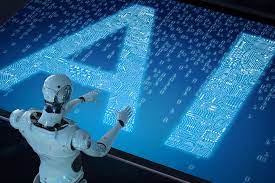
AI Technology: Revolutionising the Future of Innovation and Industry
Exploring AI Technology and Its Transformative Impact
The advent of Artificial Intelligence (AI) technology has heralded a new era in the annals of innovation. From automating mundane tasks to solving complex problems, AI is reshaping industries and redefining the way humans interact with machines.
What is AI Technology?
At its core, AI technology refers to systems or machines that mimic human intelligence to perform tasks and can iteratively improve themselves based on the information they collect. This includes capabilities such as learning, reasoning, problem-solving, perception, linguistic understanding, and more.
The Evolution of AI
AI has come a long way since its inception. Early forms of AI were rule-based systems that could only perform specific tasks provided there were explicit instructions. However, modern AI involves machine learning (ML) and deep learning—subsets of AI that allow machines to learn from data without being explicitly programmed.
Applications of AI Across Sectors
The applications of AI are vast and touch upon virtually every sector:
- Healthcare: From diagnostics to personalised medicine, AI is enabling more precise treatments and better patient outcomes.
- Retail: Retailers use AI for personalised recommendations, inventory management, and customer service through chatbots.
- Finance: In finance, algorithms are used for automated trading, fraud detection, risk management and customer service.
“Understanding the Core Technologies That Define AI”
“Key Innovations: The Major Technologies Powering Artificial Intelligence”
4. “The Progenitor of AI: Un
- What are the 4 types of AI technology?
- What technology is AI?
- What are the major AI technologies?
- Who is the father of AI?
What are the 4 types of AI technology?
In discussions surrounding AI technology, it is often categorised into four distinct types, each representing different stages of AI development and capabilities. The first type is known as Reactive Machines, which are the most basic form of AI systems that operate based on pre-programmed responses to a set of inputs, without any memory or data retention for future actions; classic examples include IBM’s Deep Blue chess program. The second type is Limited Memory AI, which can make decisions by looking at the past data for a short period; this is seen in autonomous vehicles that adjust their actions based on immediate sensor data. The third category is Theory of Mind AI, an advanced conceptual framework that would understand and process emotions and social interactions to predict behaviours – a type still in research phase. Lastly, Self-aware AI represents the pinnacle of AI development, where machines would possess consciousness, self-awareness and emotional intelligence akin to human beings; this type remains a theoretical concept as of now and poses profound philosophical questions about the nature of consciousness itself.
What technology is AI?
Artificial Intelligence (AI) technology encompasses a broad range of computational tools and systems that enable machines to perform tasks that typically require human intelligence. This includes various forms of machine learning, where algorithms are trained to recognize patterns, make decisions, and predict outcomes based on data. Deep learning, a subset of machine learning inspired by the structure and function of the human brain’s neural networks, is particularly powerful for handling complex tasks like image and speech recognition. Other AI technologies include natural language processing (NLP), which allows machines to understand and respond to human language, and robotics, where AI is applied to physical machines that interact with the real world. AI technology is constantly evolving, integrating more sophisticated models that enhance its ability to learn autonomously and perform increasingly intricate tasks across diverse domains.
What are the major AI technologies?
AI technology encompasses a wide array of tools and systems, each designed to tackle specific tasks or emulate certain facets of human intelligence. The major AI technologies include machine learning, where algorithms are trained to make predictions or decisions based on data; deep learning, a subset of machine learning with neural networks mirroring the human brain’s structure and function; natural language processing (NLP), enabling machines to understand and interact using human language; robotics, which involves the design and operation of robots that can perform tasks autonomously; and expert systems that simulate the decision-making ability of a human expert. Other significant technologies are computer vision, which allows machines to interpret and make decisions based on visual information from the world around them, and speech recognition, which converts spoken words into machine-readable input. These technologies form the backbone of current AI applications, driving innovation across various fields from healthcare to autonomous vehicles.
Who is the father of AI?
The title of ‘the father of AI’ is often attributed to John McCarthy, an American computer scientist and cognitive scientist. McCarthy is renowned for his seminal work in the field of artificial intelligence, coining the term itself in 1955 and being one of the key figures at the famous 1956 Dartmouth Conference, where the concept of AI was formally born. His contributions to AI include the development of Lisp programming language, which became crucial to the progress of AI thanks to its ability to handle symbolic information effectively. McCarthy’s vision and pioneering efforts have laid down the foundational principles that continue to underpin AI research and development today.
